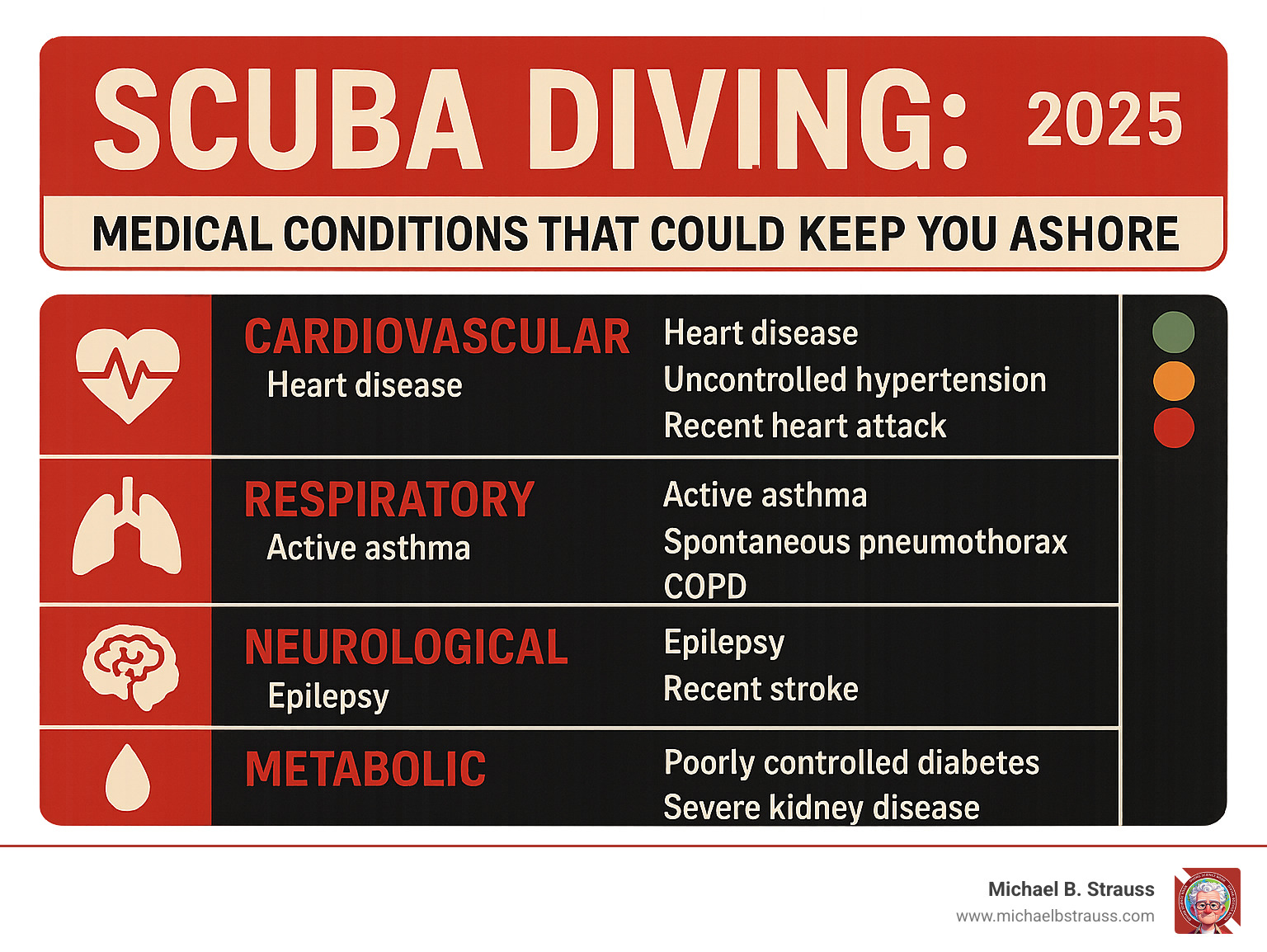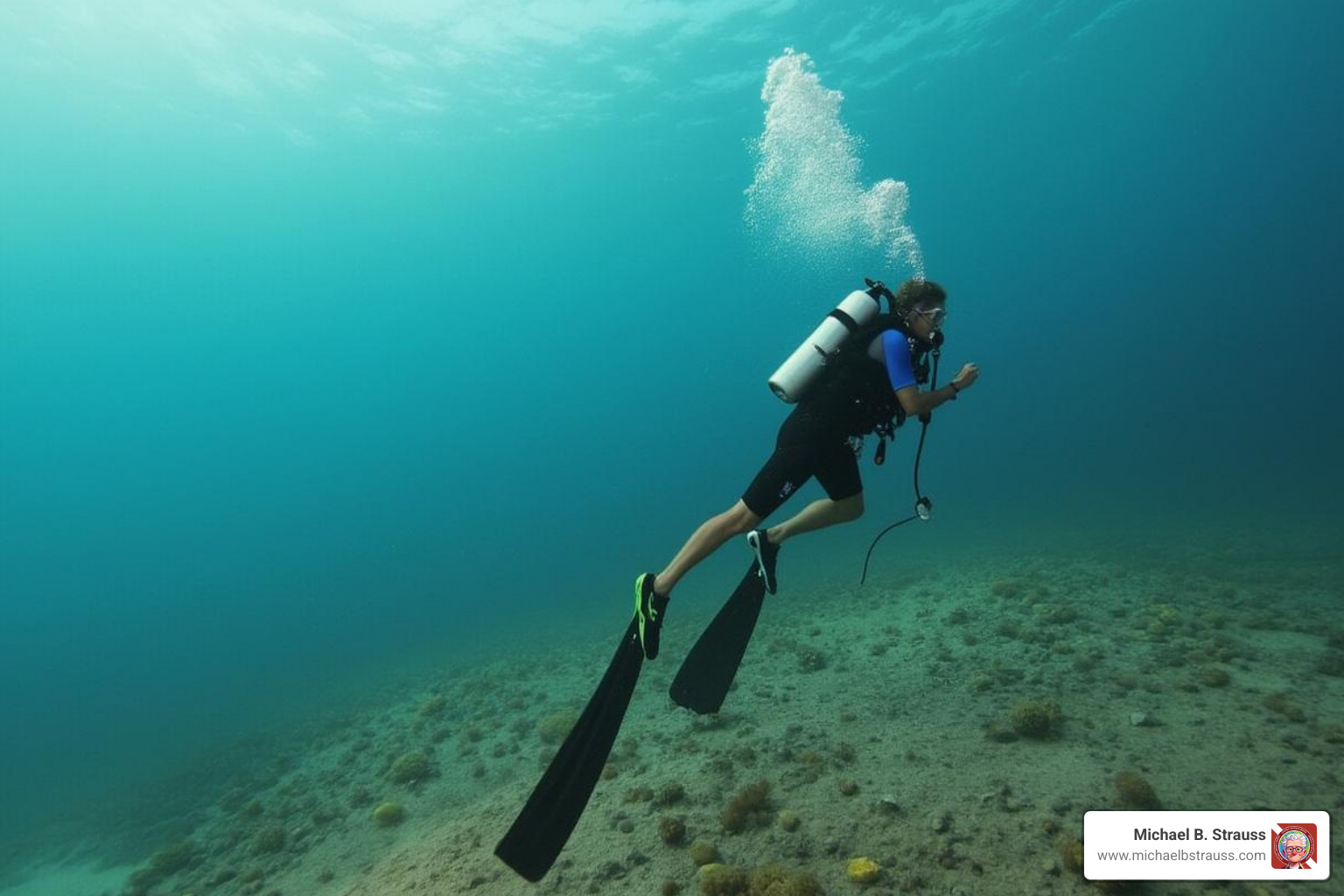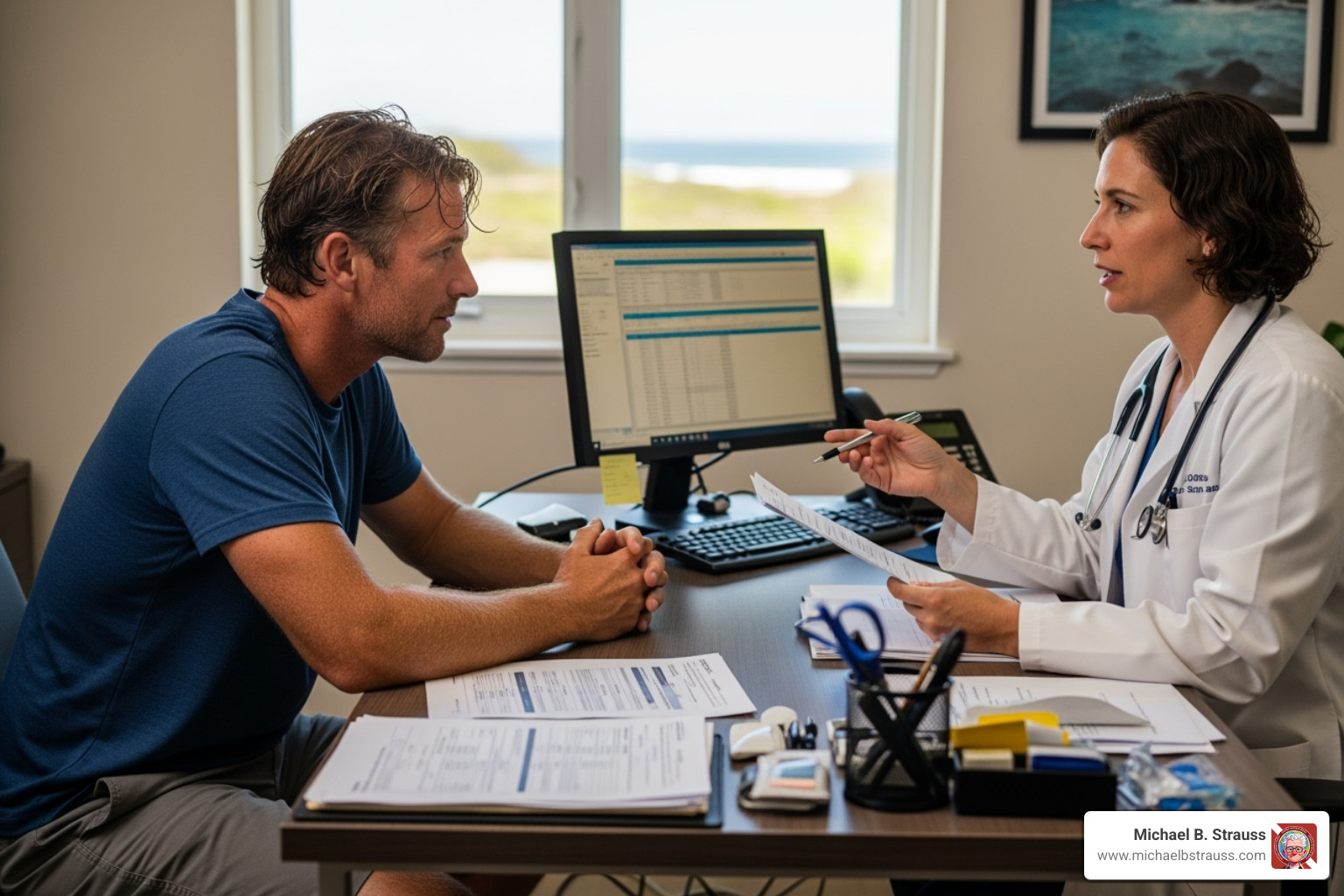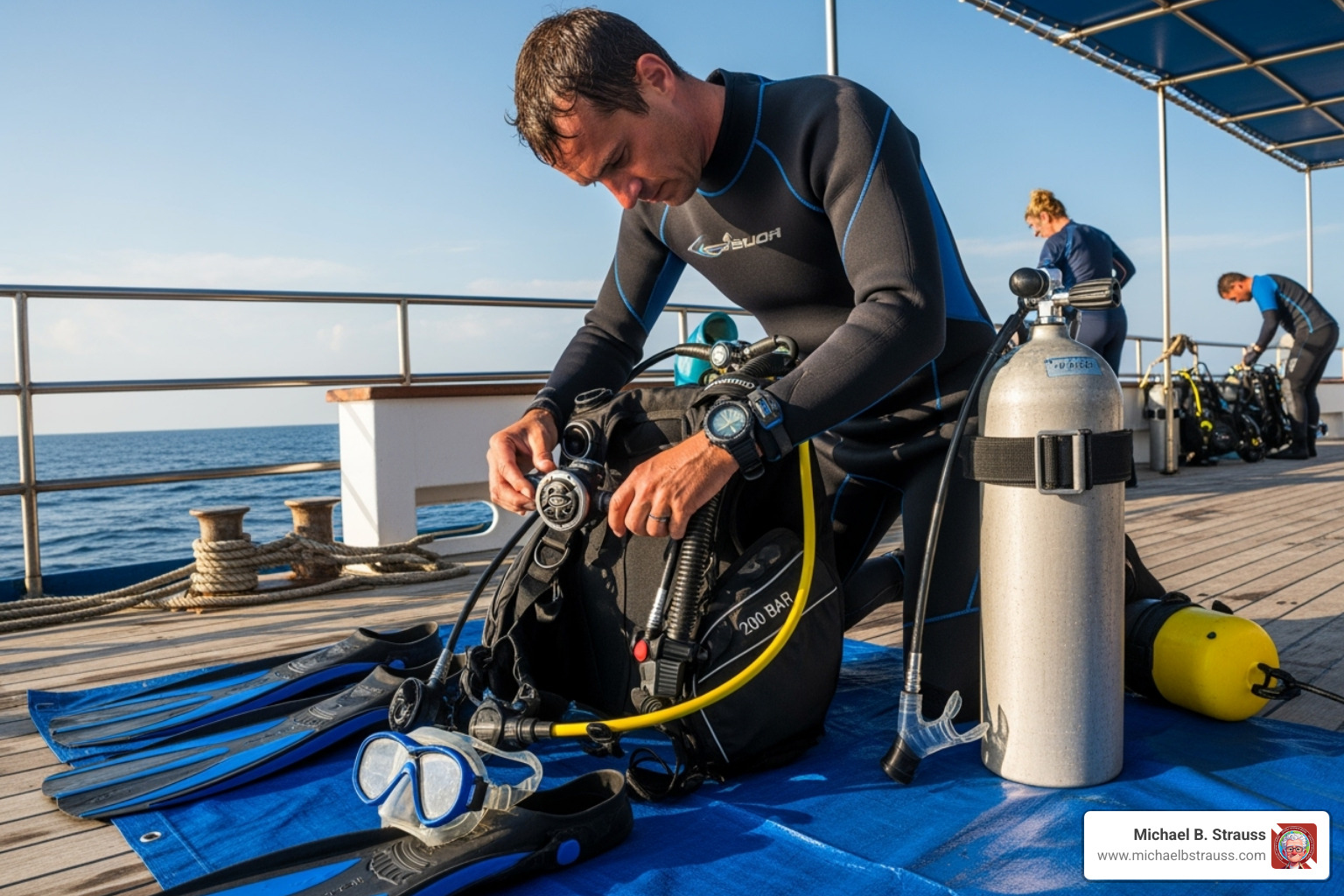Understanding the Medical Barriers to Safe Scuba Diving
What medical conditions can stop you from scuba diving is a critical question for any aspiring diver. The underwater environment creates unique physiological stresses that can turn manageable health conditions into life-threatening emergencies.
Primary medical conditions that can prevent scuba diving include:
- Cardiovascular disorders: Heart disease, uncontrolled hypertension, recent heart attack
- Respiratory conditions: Active asthma, spontaneous pneumothorax, COPD
- Neurological issues: Epilepsy, recent stroke, seizure disorders
- Metabolic disorders: Poorly controlled diabetes, severe kidney disease
- Psychological conditions: Panic disorder, severe claustrophobia, active psychosis
- Other conditions: Pregnancy, severe anemia, bleeding disorders
Research shows that up to 30% of diving deaths are caused by heart issues, making cardiovascular fitness a primary concern. While diving doesn't require an athletic physique, it does demand a level of physical and medical fitness to ensure you can handle the underwater environment safely.
The key distinction lies between absolute contraindications (conditions that completely prevent diving) and relative contraindications (conditions that may allow diving with medical clearance). For example, a history of spontaneous pneumothorax is typically an absolute contraindication, while well-controlled asthma may be a relative one. Modern diving medicine has evolved, and many conditions once considered absolute barriers can now be managed, allowing for diving with proper medical oversight.

What Medical Conditions Can Stop You From Scuba Diving?
Understanding what medical conditions can stop you from scuba diving is essential. The underwater world places unique demands on our bodies that can transform manageable health conditions into serious safety risks. Let's explore the primary health concerns that diving medicine specialists carefully evaluate.
Cardiovascular Concerns and Why They Matter for Divers
Your heart works harder underwater due to immersion and the effort of breathing dense air. This is why heart-related issues cause up to 30% of diving deaths, as found in a study of 947 recreational diving fatalities.
Hypertension (high blood pressure) is a common concern. Diving may be possible if your blood pressure is well-controlled (typically below 140/90 mmHg) with medications that have minimal side effects. Uncontrolled hypertension is a contraindication, as it can lead to stroke or fluid buildup in the lungs underwater. Certain medications like beta-blockers can reduce exercise tolerance, while others may be preferred.
Coronary artery disease and a history of heart attack are typically absolute contraindications. After a major cardiac event, a waiting period of six to twelve months is required before even considering a return to diving. Clearance would require a thorough cardiovascular evaluation, including a stress test showing an exercise capacity of at least 13 METS without symptoms.
Heart rhythm problems (arrhythmias) that could cause a loss of consciousness underwater are a serious concern. While some minor irregularities might be acceptable with medical clearance, recurring conditions like atrial fibrillation usually disqualify divers.
Patent Foramen Ovale (PFO), a small opening between the heart's upper chambers present in about 25-30% of people, poses a specific risk. It can allow gas bubbles to bypass the lungs and travel to the brain, potentially causing severe decompression sickness. Research highlights this risk, and for serious divers, surgical closure may be an option. You can find more detailed information in scientific research on PFO and decompression illness.
Respiratory Issues: What medical conditions can stop you from scuba diving?
Your lungs are critical underwater because the compressed air you breathe expands during ascent. If this expanding air gets trapped, it can cause a lung over-expansion injury (barotrauma).

Asthma evaluation has become more nuanced. If your asthma is mild, well-controlled, and not triggered by exercise or cold, you might be cleared to dive after passing lung function tests. Data suggests no increased risk of lung injuries among well-managed asthmatic divers. It's recommended to check your peak flow daily and avoid diving if it drops more than 15% from your best.
Spontaneous pneumothorax (collapsed lung) is an absolute contraindication due to the high risk of recurrence during ascent.
Chronic lung diseases like emphysema or chronic bronchitis, which cause air trapping, are also general contraindications. Similarly, active lung infections like bronchitis or pneumonia temporarily prevent diving until they are fully resolved.
Neurological and Metabolic Disorders
Conditions affecting your brain or metabolism are risky because they can cause sudden incapacitation, loss of consciousness, or impaired judgment underwater.
Epilepsy and seizure disorders are major absolute contraindications. A seizure underwater would almost certainly be fatal. Similarly, a history of stroke or mini-strokes (TIAs) generally disqualifies divers due to the risk of recurrence and underlying vascular issues.
Migraines with aura can be a concern as they are associated with a higher rate of PFOs, increasing decompression sickness risk. The symptoms can also be confused with decompression sickness, complicating treatment.
Diabetes has shifted from a blanket prohibition to an individualized assessment. Poorly controlled diabetes with complications remains a contraindication. However, well-managed diabetics can often dive safely by following strict protocols, such as maintaining stable blood glucose levels, avoiding deep or long dives, and checking levels frequently.
Anxiety and panic disorders can be dangerous, leading to hyperventilation and poor decision-making. If you have more than mild anxiety, consulting a diving psychologist is recommended.
Other significant conditions like severe anemia, bleeding disorders, or significant obesity also require careful medical evaluation due to their effects on oxygen delivery, bleeding risk, and nitrogen absorption.
Here's a quick reference for common conditions and their typical diving status:
| Condition Category | Absolute Contraindications | Relative Contraindications |
|---|---|---|
| Cardiovascular | Active coronary artery disease, uncontrolled hypertension, serious arrhythmias | Well-controlled hypertension, certain heart conditions with clearance |
| Respiratory | Spontaneous pneumothorax, severe COPD, active lung infections | Well-controlled asthma, mild respiratory conditions |
| Neurological | Epilepsy, recent stroke, active seizures | Well-controlled migraines, certain neurological conditions with clearance |
| Metabolic | Poorly controlled diabetes with complications, severe kidney disease | Well-managed diabetes, mild metabolic conditions |
Understanding what medical conditions can stop you from scuba diving helps ensure your trips are safe. The key is honest communication with qualified dive medicine specialists.
Ensuring Your Fitness to Dive
Even if you have a pre-existing health condition, the dream of diving may still be possible. The key is to take active steps to ensure you're fit for the underwater world by working with medical experts and adopting safe diving habits.
The Role of the Dive Doctor and Medical Clearance
The most important step for anyone with a pre-existing medical condition is to consult a doctor knowledgeable in dive medicine. While your regular doctor knows you, a dive medicine specialist understands the unique physiological stresses of diving and how certain conditions or medications might react underwater.

When you sign up for a dive course, you will complete a Diver Medical Questionnaire. If you answer 'yes' to any question, it signals the need for a closer look by a dive doctor. They will review your health history, current status, and may recommend specific tests like spirometry or a cardiac stress test. Honesty is your best dive buddy. Hiding a condition is extremely dangerous and puts yourself, your buddy, and rescue teams at risk. To find a qualified specialist, organizations like the Divers Alert Network (DAN) are an excellent resource: https://www.dan.org.
What medical conditions can stop you from scuba diving and how to mitigate risks?
For many conditions, especially relative contraindications, you can often dive safely by adjusting how you dive based on a personalized plan from your dive doctor. Whether you can dive depends on the severity of your condition, how well it's managed, and your overall health.
A dive medicine expert might suggest modifications such as:
- Avoiding deep dives
- Reducing exertion underwater
- Diving only in calm, warm conditions
- Using enriched air nitrox
- Allowing for longer safety stops and surface intervals
- Choosing an experienced buddy who is aware of your condition
You must also consider your medications. Many drugs can have side effects like drowsiness or dizziness that are amplified underwater. Decongestants can wear off mid-dive, causing a painful reverse block during ascent. Psychoactive drugs can impair judgment and reaction time. Always discuss all medications with your dive doctor, as there is limited research on how most drugs behave under pressure.
Final Safety Checks and Responsible Diving
The decision to dive rests on your shoulders. This requires personal responsibility, continuous learning, and a commitment to your well-being.

Always listen to your body and know your physical and mental limits. If you don't feel 100% or if conditions are challenging, it is always wisest to cancel the dive. There is no shame in sitting one out.
Your dive buddy is a critical part of your safety system. Ensure they are well-trained and fully informed about any medical conditions you have and the appropriate emergency procedures. Be equally open with your dive operator so they can provide support and be prepared for any situation.
Health is not static, so continuous monitoring is essential. Regular check-ups become more important with age; for example, guidelines suggest cardiac evaluations for men around age 45 and women around age 55. Finally, never stop learning. Stay informed about the latest in dive medicine through organizations like DAN and the Undersea & Hyperbaric Medical Society (UHMS). For comprehensive insights into dive physiology and safety, the diving books by Dr. Michael B. Strauss are invaluable resources for divers of all levels.
By diligently addressing what medical conditions can stop you from scuba diving and working with medical professionals, you can ensure your underwater trips remain safe and enjoyable.
For a deeper dive into the science of diving, get your copy of "Diving Science Revisited" today.
DISCLAIMER: Articles are for "EDUCATIONAL PURPOSES ONLY", not to be considered advice or recommendations.






